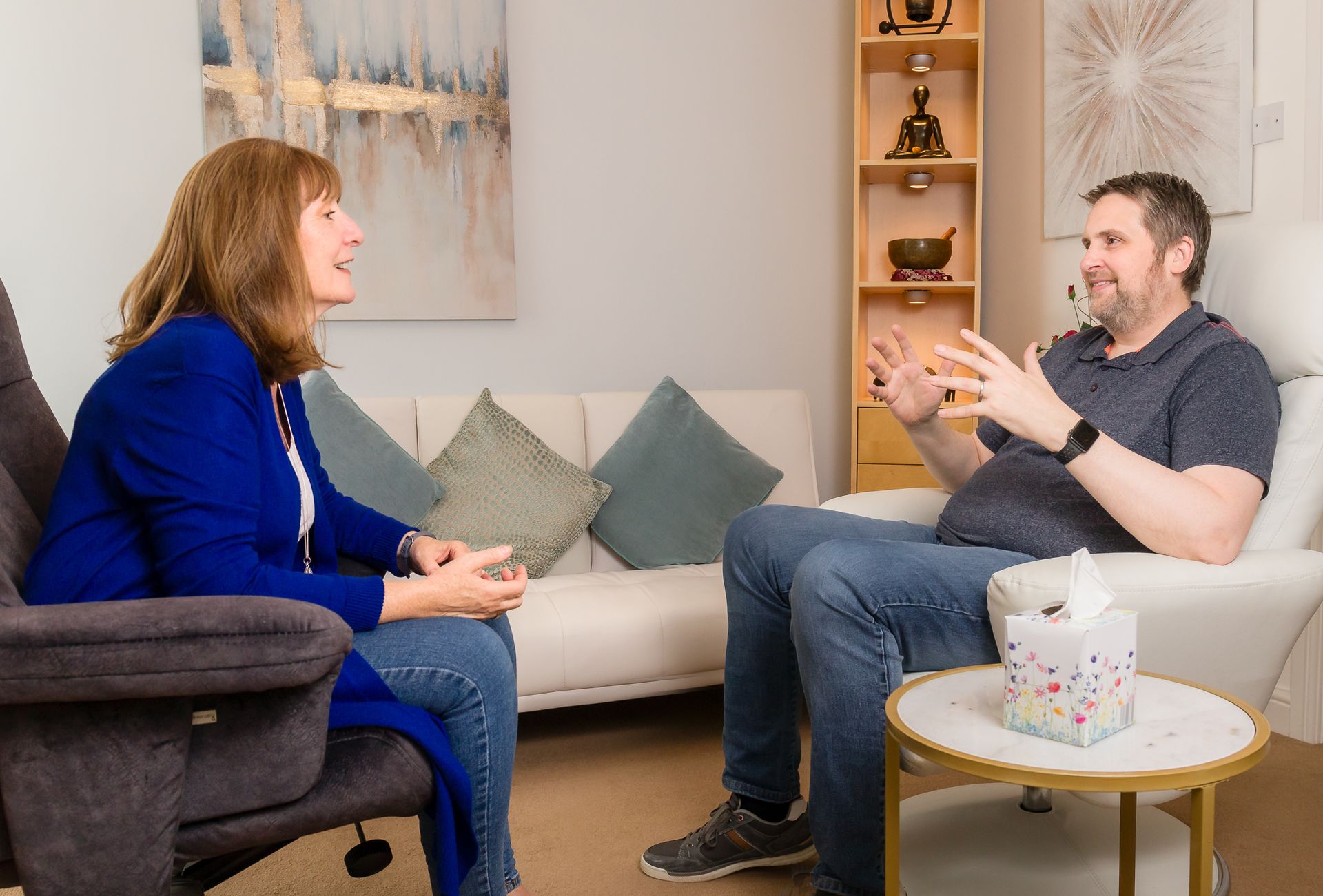How to Train Your Brain to Boost Positive Mental Fitness
Karen Hemmings • 28 February 2024
Neural Pathways Unleashed: 10 Ways to Boost Positive Mental Fitness

Unlocking the full potential of your brain involves understanding and harnessing the power of neural pathways.
These intricate networks of connections within the brain dictate how information is processed, habits and memories are formed, and skills are acquired. Just as a well-worn trail through the woods becomes more defined with each passing, repetitive step, your neural pathways strengthen and adapt through consistent mental activities.
If you have developed negative thinking patterns over time, for instance if you have anxiety, if you tend to think the worse may happen, or if you constantly worry, it could be that you have embedded negative neural pathways, and it may feel hard to reverse them. It is always advisable to seek professional counselling and medical support if you need it.
You can help to improve your own mental fitness by fostering new, positive neural pathways. This involves promoting and reinforcing positive thoughts, behaviours, and attitudes to strengthen the connections in your brain associated with those positive experiences. Here are some strategies to help you do it, start with one or two and develop more as and when you can:
1. Positive Affirmations:
Use positive affirmations to challenge and replace negative self-talk. Repeat positive statements about yourself and your abilities to rewire your brain towards a more positive outlook.
2. Gratitude Practices:
Regularly express gratitude by keeping a gratitude journal. It can be as simple as writing down 1-3 things a day that you are thankful for, this fosters a positive mindset and reinforcing positive neural connections.
3. Positive Visualisation:
Engage in positive visualisation exercises. Imagine yourself succeeding, achieving your goals, and experiencing positive outcomes. Visualization can help reinforce positive neural pathways associated with success.
4. Positive Self-Talk:
Be mindful of your internal dialogue. Replace self-critical thoughts with positive and encouraging affirmations. Treat yourself with the same kindness and support that you would offer to a friend.
5. Break Negative Patterns:
Identify and work on breaking negative thought patterns. When you catch yourself dwelling on negative thoughts, consciously shift your focus to more positive and constructive thoughts.
6. Mindfulness and Meditation:
Practice mindfulness and meditation to become more aware of your thoughts and emotions. Mindfulness can help you observe negative thoughts without judgment and redirect your focus toward positive aspects.
7. Social Connections:
Surround yourself with positive and supportive people. Social interactions and positive relationships can have a profound impact on your neural pathways. Positive social interactions can release neurotransmitters like oxytocin, which contribute to feelings of happiness and well-being.
8. Learn New Things:
Engage in activities that challenge your mind and encourage learning. Whether it's picking up a new hobby, learning a new skill, or taking on a new intellectual challenge, the process of learning stimulates the brain in positive ways.
9. Physical Exercise:
Regular physical exercise has been linked to improved mood and cognitive function. Exercise stimulates the release of neurotransmitters and growth factors that contribute to the formation of positive neural connections.
10. Quality Sleep:
Last and by no means least ensure you get enough quality sleep. Sleep is essential for memory consolidation, filing all of the positive practices, embedding those new positive pathways and for overall brain health. Lack of sleep can contribute to negative thought patterns and decreased resilience to stress.
Remember that fostering positive neural pathways is an ongoing process. Consistency is key, and these practices may take time to yield noticeable results. Regularly engaging in these activities can contribute to a more positive and resilient mindset over time.
If you need additional support either to help you start developing these new ways, or if you are interested in talking professionally to a counsellor, or developing new ways of thinking through clinical hypnotherapy, or Emotional Freedom Therapy then please get in touch. All the ways to contact me are on the contacts page.
The Healing Mind provides a range of Counselling and Hypnotherapy services in Gnosall, Stafford, as well as Reiki, Emotional Freedom Therapy (EFT) and Neuro Linguistic Programming (NLP).

Most people carry a fear of something. For some, it’s the flutter in the stomach when looking down from a height. For others, it’s the dread of public speaking, the tension of stepping onto a plane, or the sudden rush of panic at the sight of a spider. Fears and phobias are incredibly common—and yet many people silently endure them for years, believing they simply have to “live with it.” But you don’t. Your Fear Is Not Your Fault Phobias often develop from a moment your mind interpreted as threatening. Sometimes you remember the moment clearly, and sometimes you don’t—but your subconscious does. Its job is to protect you, and it works hard… sometimes too hard. What begins as a single stressful experience can evolve into a pattern of avoidance, anxiety, and emotional overwhelm. But the good news is this: Patterns can be changed. The subconscious can be re-taught. And you can feel safe again. Hypnotherapy: A Calmer Path to Change Hypnotherapy works gently and compassionately with the subconscious mind—the part of you that stores old fears, emotional memories, and automatic reactions. In a relaxed, comfortable state, your mind becomes more open to new possibilities. You’re not “asleep,” and you’re not out of control. Instead, you are deeply focused and receptive, allowing therapeutic suggestions to reframe old beliefs and dissolve emotional triggers. Clients often describe the experience as: “Deeply soothing” “Surprisingly empowering” “Like my mind finally had permission to let go" (If you would like to read about some personal hypnotherapy experiences - click here ) This isn’t about forcing yourself to be brave. It’s about rewiring the internal response so the fear simply loses its hold. Imagine If… The spider that once caused panic becomes nothing more than a passing inconvenience Heights stop triggering that familiar rush of dread Public speaking feels manageable—or even exciting Flying becomes uneventful instead of overwhelming Everyday situations stop feeling like battles Your body remains calm even in moments that used to feel unbearable These shifts often happen much more quickly than people expect, because hypnotherapy works with the root—not just the symptoms. I'm here to help Whether your fear is mild or overwhelming, whether it’s new or something you’ve lived with for decades, if your fear or phobia is affecting your life—your relationships, your choices, and your wellbeing—you deserve support that is gentle, effective, and compassionate. Clinical hypnotherapy offers: A safe, non-judgmental space Evidence-based techniques Tailored sessions that meet you exactly where you are Tools you can use in daily life to stay grounded and calm Long-lasting change, not temporary coping Your Next Step Toward Freedom You are not broken. You are not weak, you are someone whose mind learned to protect you in a way that no longer serves you—and that can be changed. If you’re ready to feel lighter, calmer, and more in control, then your journey can begin today—one calm breath at a time. If you are interested in finding out more, then please get in contact for a free 30-minute telephone consultation.

The BBC drama Riot Women has struck a chord by portraying women in mid-life with honesty, humour, and energy. Following five menopausal women who form a punk rock band, the show highlights struggles that many women experience during menopause — from emotional ups and downs to shifts in identity and self-confidence. Why Menopause Can Be Challenging Menopause isn’t just about hot flushes or hormonal changes. Many women report: Feeling invisible or overlooked Brain fog and feeling like someone else entirely at times Heightened anxiety or low mood Difficulty managing stress from work, family, or caregiving Frustration, anger, or a sense of lost purpose These experiences can affect relationships, work, and overall well-being. Seeing these struggles represented on screen, as in Riot Women, can be validating — it reminds women they are not alone. How Counselling Can Help Counselling offers a safe, confidential space to: Explore changing identity – rediscover who you are beyond societal roles or expectations Manage emotions – understand and express anger, sadness, or frustration in healthy ways Build resilience – develop coping strategies for stress, anxiety, or low mood Find support and community – connect with others experiencing similar life transitions Just like the women in Riot Women find strength through music and friendship, therapy can provide tools and support to navigate the menopause journey with confidence and clarity. Help Is Available Menopause is a natural stage of life, but it can feel overwhelming without support. Counselling helps women process the emotional impact, reclaim agency, and embrace this transition with empowerment. If you’re struggling with menopause symptoms or the emotional challenges of mid-life, please get in touch, and I can help you feel seen, heard, and supported.

As the nights draw in and the days grow shorter, it’s common for life’s challenges to feel a little heavier. Anxiety, stress, family tensions, or the grief of loss can feel more intense when daylight fades, and the pace of life slows. This is a time when self-care and support can make all the difference. I understand how important it is to have a safe, confidential, and non-judgemental space nearby — somewhere you can talk openly and begin to make sense of your experiences. My approach is warm, professional, and person-centred. Therapeutic counselling forms the foundation of my work, providing a space to explore emotions, relationships, and challenges. For those looking for complementary approaches, I also offer hypnotherapy and Emotional Freedom Therapy (EFT) to help release tension and support emotional resilience. For gentle energy support, Reiki healing can bring calm and restore balance. During this season, a few practical steps can help maintain wellbeing: Stay connected: Make time for friends, family, or supportive community groups. Keep active: Even short walks outdoors can boost mood and reduce stress. Mindful moments: Pause daily for quiet reflection, deep breathing, or journaling. Nourish yourself: Regular, balanced meals and adequate sleep support mental resilience. Seek support early: Speaking to a professional doesn’t wait until problems feel overwhelming. Every journey is unique, and my role is to help you find understanding, tools, and inner strength to navigate life’s challenges with greater peace and confidence. I offer a welcoming, trusted space to start that journey — a place to be heard, supported, and cared for as the season changes. If you would like to find out how I may be able to help you, then please get in touch for a free, 30-minute telephone consultation, or to book an appointment.

We all have an inner critic — that voice that tells us we’re not good enough, smart enough, or doing enough. While it may think it’s protecting us from failure, it often just fuels anxiety and self-doubt. The good news is, you can quieten it. Here are ten ways to turn down the volume on your inner critic and nurture a kinder inner voice: 1. Notice the voice – The first step is awareness. Pay attention to when that critical inner dialogue appears and what triggers it. Awareness gives you choice. 2. Name it – Give your inner critic a name or persona. It helps create distance between you and the voice. “Oh, that’s just ‘Judge Judy’ again.” 3. Challenge the evidence – Ask yourself: Is this thought actually true? Look for facts that support and contradict it. Most of the time, it’s not based in reality. 4. Reframe mistakes as learning – Instead of beating yourself up for getting it wrong, remind yourself that mistakes are part of growth. 5. Use compassionate self-talk – Speak to yourself as you would a good friend. Replace “I’m useless” with “I’m doing my best and learning as I go.” 6. Practice mindfulness – Stay in the present moment. When the critic drags you into past regrets or future fears, gently bring your attention back to now. 7. Limit comparison – Comparing yourself to others fuels self-criticism. Focus on your own progress and values instead. 8. Write it out – Journaling helps externalise the critic’s voice. Once it’s on paper, you can challenge it more clearly. 9. Use techniques like Emotional Freedom Technique (EFT) or hypnotherapy to help release the emotional charge behind self-critical thoughts. 10. Celebrate small wins – Notice and acknowledge what you do well each day. The more you recognise your strengths, the quieter the critic becomes. Quieting your inner critic is an ongoing practice, but each time you respond with self-compassion, you strengthen a more supportive inner voice — one that helps you grow instead of holding you back. If your inner critic feels hard to silence, please reach out for support. Gentle, effective approaches like counselling, hypnotherapy or EFT can help you release old patterns and reconnect with confidence and calm. Please get in contact to explore how this support could help you find more peace within.

So many people believe they should cope with everything on their own. But asking for help is not a sign of weakness — it’s an act of courage. It shows strength, self-awareness, and a willingness to move toward positive change. When you reach out for support, you’re not giving up. You’re choosing not to struggle alone. You’re choosing to face challenges with guidance, compassion, and clarity. Counselling offers a safe, confidential space to explore what’s weighing you down and to find new ways forward. Whether you’re dealing with stress, anxiety, low mood, or feeling overwhelmed, talking to a professional can make all the difference. You deserve support. You deserve to feel heard. And you deserve to heal. Asking for help is the first step — and it might just be the one that transforms everything. If you’re ready to take that step, I’m here to support you. Please get in contact for a free 30-minute telephone consultation, you can call, email or fill in a form, or if you prefer you can book at a time that suits you here, and I will give you a ring at your chosen time.

Menopause brings many changes — physically, emotionally, and mentally. For some women, it’s a smooth transition. For others, it can feel overwhelming. Fluctuating hormones can affect mood, sleep, confidence, and focus, often leaving you feeling stressed, anxious, or not quite yourself. In my counselling and hypnotherapy sessions, I support women to find calm and confidence during this time of change. Together, we focus on easing stress and anxiety, improving sleep, and helping you feel more balanced and in control again. Counselling offers a safe, supportive space to talk openly about what you’re experiencing, while hypnotherapy helps your mind and body deeply relax — releasing tension and promoting emotional wellbeing. These gentle approaches can help you: • Manage stress and anxiety • Rebuild confidence and self-esteem • Improve sleep and relaxation • Feel more grounded and in tune with yourself Menopause doesn’t have to feel like a battle. With the right support, it can become a time of renewal — a chance to slow down, care for yourself, and rediscover your strength. Please get in contact for a free 30-minute telephone consultation, you can call, email or click the button below to book at a time that suits you too, and I will give you a ring at your chosen time.

Do you ever catch yourself saying “yes” when deep down you want to say “no”? Or notice that you’re putting everyone else’s needs first, leaving little energy for your own? Many caring, thoughtful people fall into the pattern of people-pleasing. It often comes from a good place—wanting to keep the peace, avoid conflict, or make sure others feel happy. But over time, this way of living can become heavy. You might feel unseen, unheard, or even disconnected from who you really are. Why People-Pleasing Feels So Draining When we focus so much on pleasing others, we can lose touch with ourselves. • Decisions become stressful because you’re worried about disappointing someone. • Boundaries blur, leaving you tired and stretched thin. • Even simple choices—like what you’d like for dinner—can feel complicated. • It can feel as though you’re constantly “performing,” instead of living in a way that feels natural and authentic. How Counselling Can Help Counselling provides a gentle, supportive space where you can: • Explore your patterns — understand where your people-pleasing comes from, without judgment. • Rediscover your voice — practice expressing your needs in small, safe steps. • Build healthy boundaries — learn that saying “no” can be an act of self-care, not selfishness. • Strengthen self-compassion — replace guilt and self-criticism with kindness and understanding. Bit by bit, counselling helps you reconnect with the part of yourself that longs to be heard, respected, and valued. Living More Authentically Letting go of people-pleasing doesn’t mean you stop being kind or caring. It means you start including yourself in the kindness. When you honour your own needs alongside others’, your relationships grow stronger, your energy returns, and life feels more balanced. You move from living for approval… to living with authenticity. A Gentle Invitation If any of this resonates with you, counselling can be a safe place to begin. You don’t have to change everything at once. Even the smallest step—talking it through with someone who understands—can bring relief and clarity. Your voice matters. Your needs matter. And with help, you can begin to live in a way that feels true to you. Please get in contact if you would like some support.

For many parents and caregivers, the school holidays can be a double-edged sword. While they offer precious time with children and a break from routine, they also bring a host of challenges—disrupted schedules, constant demands for attention, increased financial pressure, and the mental load of keeping everyone entertained and safe. It’s no surprise that stress levels can rise during this period. The usual structure disappears, personal time can vanish, and feelings of overwhelm are common. But with a little awareness and some practical strategies, it is possible to navigate the school holidays with more ease and even find moments of calm and connection. Here are a few things to keep in mind: 1. Let Go of Perfection: The pressure to create a “perfect” holiday for your children can be immense. Remember, your presence matters more than packed schedules or expensive activities. Children often value small, shared moments over grand plans. 2. Carve Out Time for Yourself: Even 10–15 minutes a day to reset can make a difference. Whether it’s a quiet cup of tea, a short walk, or a few mindful breaths, prioritising small breaks can help you stay grounded. 3. Share the Load: If possible, ask for help—from partners, friends, or family. Playdates and shared childcare can give everyone a much-needed breather. 4. Manage Expectations: Not every day will be smooth. Some days will be tough—and that’s okay. Self-compassion is key. You’re doing your best, and that’s enough. 5. Talk It Through: If the strain feels too much, talking to a counsellor can offer support and clarity. Sometimes, just having a space to offload and reflect can make all the difference. The school holidays will pass, but your wellbeing matters all year round. By taking care of yourself as well as your family, you lay the foundation for a more peaceful and connected break—for everyone.

Feeling different from those around you can be a deeply isolating experience. Whether it's the way you look, the way you think, your background, your sexuality, your values, or your personality – when you feel like you don’t quite “fit in,” it can lead to feelings of exclusion and rejection. This sense of being on the outside can chip away at your self-worth and leave you questioning your value and place in the world. For many, these feelings begin early in life, perhaps at school, within family dynamics, or in social settings where conforming to a certain norm is rewarded and difference is quietly – or not so quietly – judged. Over time, you might start to believe that your uniqueness is something to hide, rather than something to honour. You may even find yourself trying to change or shrink who you are in order to be accepted by others. But what if your difference is actually your strength? The Role of Counselling Counselling offers a safe, non-judgemental space to explore these painful experiences. Through talking therapy, you can begin to unpack the layers of rejection, shame, or insecurity that may have built up over time. Together with a counsellor, you can start to understand where these feelings originated, how they affect your current life, and – most importantly – how to gently challenge them. One of the most empowering aspects of counselling is discovering that what you think about yourself matters more than what others think. This shift in perspective can be life-changing. When your self-worth no longer hinges on the approval of others, you begin to reclaim your confidence and identity on your own terms. Counselling can help you: • Recognise the value in your individuality • Understand and process past experiences of exclusion or rejection • Reframe negative self-beliefs and build self-compassion • Develop tools for emotional resilience and self-acceptance • Strengthen your voice and sense of self As your self-awareness grows, you may begin to see your differences not as something to be ashamed of, but as something to be celebrated. The qualities that set you apart might be exactly what give you depth, creativity, empathy, or strength. What once felt like a source of pain can become a source of pride. Moving Towards Self-Confidence With the support of counselling, many people find they are able to let go of the need to please or fit in, and instead begin to live more authentically. As you start to trust your own thoughts and feelings more deeply, self-confidence grows naturally. You become less defined by the expectations of others and more connected to your true self. It’s not about pretending the pain of rejection never happened. It’s about healing from it – and realising that you don’t need to be anyone other than who you are. If you would like to find out more about how counselling may help you, then please get in touch.

